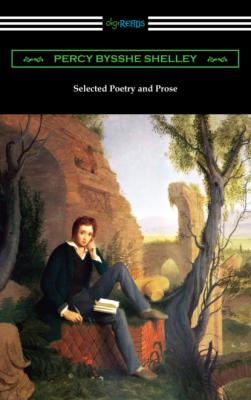Selected Poetry and Prose. Percy Bysshe Shelley
Чтение книги онлайн.
Читать онлайн книгу Selected Poetry and Prose - Percy Bysshe Shelley страница 40
 Imagination, cannot die;
Imagination, cannot die;
They are, what that which they regard appears,
The stuff whence mutability can weave
All that it hath dominion o’er, worlds, worms,
Empires, and superstitions. What has thought
To do with time, or place, or circumstance?
Wouldst thou behold the Future?—ask and have!
Knock and it shall be opened—look, and lo!
The coming age is shadowed on the Past
As on a glass.
MAHMUD. Wild, wilder thoughts convulse
My spirit—Did not Mahomet the Second
Win Stamboul?
AHASUERUS. Thou wouldst ask that giant spirit
The written fortunes of thy house and faith.
Thou wouldst cite one out of the grave to tell
How what was born in blood must die.
MAHMUD. Thy words
Have power on me! I see—
AHASUERUS. What hearest thou?
MAHMUD. A far whisper—
Terrible silence.
AHASUERUS. What succeeds?
MAHMUD. The sound
As of the assault of an imperial city,
The hiss of inextinguishable fire,
The roar of giant cannon; the earthquaking
Fall of vast bastions and precipitous towers,
The shock of crags shot from strange enginery,
The clash of wheels, and clang of armed hoofs,
And crash of brazen mail as of the wreck
Of adamantine mountains—the mad blast
Of trumpets, and the neigh of raging steeds,
The shrieks of women whose thrill jars the blood,
And one sweet laugh, most horrible to hear,
As of a joyous infant waked and playing
With its dead mother’s breast, and now more loud
The mingled battle-cry,—ha! hear I not
‘Εν τούτῳ νίκη—’ ‘Allah-illa-Allah!’?
AHASUERUS. The sulphurous mist is raised—thou seest—
MAHMUD. A chasm,
As of two mountains in the wall of Stamboul;
And in that ghastly breach the Islamites,
Like giants on the ruins of a world,
Stand in the light of sunrise. In the dust
Glimmers a kingless diadem, and one
Of regal port has cast himself beneath
The stream of war. Another proudly clad
In golden arms spurs a Tartarian barb
Into the gap, and with his iron mace
Directs the torrent of that tide of men,
And seems—he is—Mahomet!
AHASUERUS. What thou seest
Is but the ghost of thy forgotten dream.
A dream itself, yet less, perhaps, than that
Thou call’st reality. Thou mayst behold
How cities, on which Empire sleeps enthroned,
Bow their towered crests to mutability.
Poised by the flood, e’en on the height thou holdest,
Thou mayst now learn how the full tide of power
Ebbs to its depths.—Inheritor of glory,
Conceived in darkness, born in blood, and nourished
With tears and toil, thou seest the mortal throes
Of that whose birth was but the same. The Past
Now stands before thee like an Incarnation
Of the To-come; yet wouldst thou commune with
That portion of thyself which was ere thou
Didst start for this brief race whose crown is death,
Dissolve with that strong faith and fervent passion
Which called it from the uncreated deep,
Yon cloud of war, with its tempestuous phantoms
Of raging death; and draw with mighty will
The imperial shade hither.
[Exit AHASUERUS.]
[The Phantom of MAHOMET THE SECOND appears.]
MAHMUD. Approach!
PHANTOM. I come
Thence whither thou must go! The grave is fitter
To take the living than give up the dead;
Yet has thy faith prevailed, and I am here.
The heavy fragments of the power which fell
When I arose, like shapeless crags and clouds,
Hang round my throne on the abyss, and voices
Of strange lament soothe my supreme repose,
Wailing for glory never to return.—
A later Empire nods in its decay.
The autumn of a greener faith is come,
And wolfish change, like winter, howls to strip
The foliage in which Fame, the eagle, built
Her aerie, while Dominion